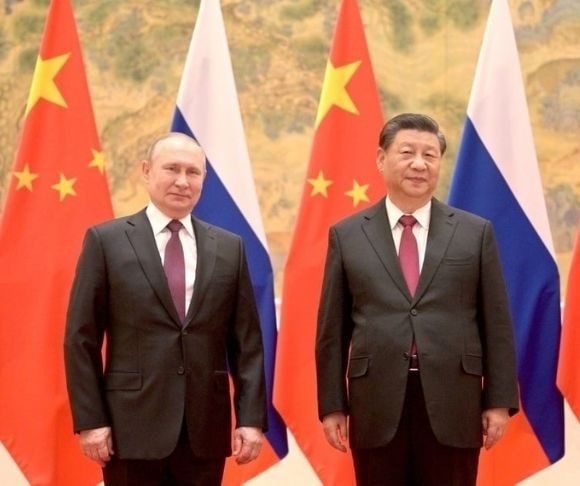
Vladimir Putin (L) and Chinese President Xi Jinping (Photo by Kremlin Press Office/Handout/Anadolu Agency via Getty Images)
February 4, 2022, President Vladimir Putin and China’s President Xi Jinping issued the “Joint Statement of the Russian Federation and the People’s Republic of China (PRC) on the International Relations Entering a New Era and the Global Sustainable Development.” The document was a public announcement memorializing the two countries’ mutual admiration, security, and 30-year energy and bilateral economic wealth agreement. As you would suspect, the joint statement content had all the highfalutin language about “cultural diversity,” “rights of peoples of different countries to self-determination,” and “promote genuine democracy.” Nevertheless, there are important messages in the joint statement once the reader cuts through all the nonsensical claptrap coming from two nations least likely to put into practice any of the values implicit in the words used.
When stripped to its most basic intended narrative, the “Joint Statement” is a screed against the United States, NATO, US Indo-Pacific allies, and their combined global security and economic aspirations. In a sentence, what Russia and China told the world in 5,364 words, not counting the title and date, is “We are collaborating to be the economic and geopolitical leaders of the world to the exclusion of every other nation’s interest. So, get used to it.” This narrative carries a warning NATO, the EU, and the US should have bright on their radars. The statement declares:
“The sides agreed to continue consistently intensifying practical cooperation for the sustainable development of the Arctic. The sides call upon all countries to strengthen cooperation in sustainable transport, actively build contacts and share knowledge in the construction of transport facilities, including smart transport and sustainable transport, development, and use of Arctic routes, as well as to develop other areas to support global post-epidemic recovery.”
Both Moscow and Beijing have made no secret about plans for establishing dominion over the Arctic. They dress up their intentions with language like “cooperation within multilateral mechanisms.” Without the window dressing, the two countries mean more collaboration in developing the Arctic region to benefit them. “China hopes to work with all parties to build a ‘Polar Silk Road’ through developing the Arctic shipping routes,” Reuters reported. “China’s increasing prominence in the region has prompted concerns from Arctic states over its long-term strategic objectives, including possible military deployment.”
Meanwhile, Russia is moving forward with an intense focus on building up its Arctic military facilities. The recent Russia-China agreement would substantiate the observation the Kremlin and Communist Chinese Party (CCP) see the Arctic as an opportunity to work in concert with a joint front to oppose others from benefitting from the region. CCP and Kremlin navies controlling the sea lanes of large swaths of the Bearing Sea, Norwegian Sea, Baltic Sea, and potential warm water pathways around the North Pole could hold a vast number of transportation routes at risk.

Vladimir Putin (L) and Chinese President Xi Jinping (Photo by Kremlin Press Office/Handout/Anadolu Agency via Getty Images)
As ominous as the prospect of Russia and China dominating access to the Arctic is, cooperation between the two nations is not a done deal. “Driven by the various Arctic interests, China has outlined an ambitious Arctic strategy with its Polar Silk Road initiative and the 2018 Arctic White Paper. But it is Russia, as rightly noted by Bobo Lo, an expert on Sino-Russian relations, that retains a decisive say on how far Beijing’s Arctic goals can be realized — and Russia does not look kindly on those aspirations,” explained Jeremy Greenwood and Shuxian Luo in War on the Rocks. The Polar Silk Road is a critical extension of Beijing’s Belt and Road initiative and not one the CCP will abandon easily, regardless of Xi’s BFF Putin. Moreover, the PRC’s guiding strategic plan started in 2013 is to circle the globe with its economic and military dominance by 2049. Any attempt by Russia to hinder this strategy would not be viewed favorably by Beijing.
There are ample reasons for the Biden administration to look at the Russia-China friendship/energy pact with alarm – not the least of which is that the United States is an Arctic nation and has a significant interest in seeing the region remains free from the pure self-interest of China and Russia. The US Navy has increased its frequency of operations in the Bearing Sea, but vigilance on the intrusion of Moscow’s and Beijing’s presence must be persistent.
The views expressed are those of the author and not of any other affiliation.
Remember to check out the web’s best conservative news aggregator
Whatfinger.com — the #1 Alternative to the Drudge

